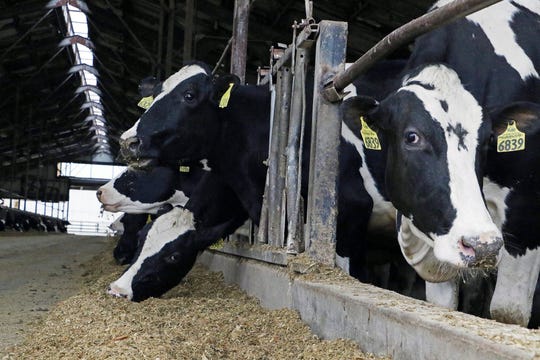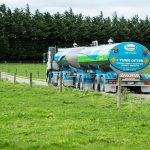
Secretary of Agriculture Sonny Perdue stated that production of America’s food supply is an “essential” industry. Jim Ostrom, CEO of Milk Source, LLC, says it his businesses’ intent and obligation to continue providing safe, timely and healthy food.
“Not since World War II has there been a more important time to fulfill this responsibility. In light of the current situation, we will do what dairymen and farmers have always done — step up when needed the most,” Ostrom said.
The U.S. Department of Homeland Security (DHS) listed U.S. food and agriculture among the 16 critical industries whose workforce should continue as the country responds to the virus outbreak.
“If you work in a critical infrastructure industry, as defined by the Department of Homeland Security, such as healthcare services and pharmaceutical and food supply, you have a special responsibility to maintain your normal work schedule,” the guidance states.
Instead of panicking, many farms are seeing the benefit of having a crisis plan in place for their businesses. Milk Source, which operates four dairies in Wisconsin as well as farms in Michigan, Missouri and Kansas, has long maintained a Crisis Action Plan that is constantly reviewed and updated. While not specific to a pandemic, Ostrom says it was designed to allow flexibility in the businesses’ responses to the current pandemic.
“As concerns about COVID-19 increased, our Human Resources Department researched current government guidelines as well as private sector best practices to formulate our ongoing course of action,” Ostrom said.
He says Milk Source is erring on the side of caution in regards to the virus. Workers that display symptoms are asked to stay home and self quarantine for 14 days or until cleared by a physician. Those who have traveled outside of the country are asked to do the same.
Ostrom says Milk Source wants all employees erring on the side of caution.
“We are asking any team member displaying symptoms to communicate with their supervisor and, if necessary, human resources,” he said. “There’s truth to the axiom: An ounce of prevention is worth a pound of cure.”
A week ago, Gov. Tony Evers directed the state Department of Health Services to issue an order mandating statewide closure of all public and private schools, and subsequently placing new restrictions on daycare centers limiting the number of children and workers – leaving many families scrambling for childcare.
“We understand that everybody’s domestic situation is different. There’s no one-size-fits-all policy on paper that can encompass every team member’s specific home needs,” he said. “Impacted team members continue to work directly with their supervisors to reach realistic accommodations.”
Ostrom and his partners are committed to limiting the impact of COVID-19 to their farms. Key is arming employees with good, solid information. All communications to team workers are provided in both Spanish and English via Milk Source’s intranet website, multiple emails from the HR department, farm newsletters and daily direct calls to dairy managers.
“This isn’t a “one-and-done” memo, but rather a consistent, ongoing messaging campaign that will be reinforced as long as necessary and through a number of channels,” Ostrom said.
Through those avenues of communication, the business has emphasized critical information about the best prevention strategies; local health resources; and essential medical resources.
“Like other employers across all sectors, it is better for employees to have the information and not need it than to need it and not have it,” he said.
The dairy also provides workers access to products such as hand sanitizer, soap, towels and Kleenex, that help them to practice good hygiene in helping to prevent the spread of illness.
While Milk Source is passionate about educating the public about agriculture, they have made the decision to suspend all non-essential visits to the dairies – including public tours – through April, at which time they will reassess the situation.
“Modern technology — such as social media — allows us to continue our “agvocacy” efforts without the need to bring people physically onto the dairies,” Ostrom said.
While some crisis planners advocate for screening employees before they step on to the farm, Ostrom says they have not resorted to these measures at this time.
“Since even medical experts aren’t sure what to “expect” with this new virus, we recognize that all options that best protect our team members should remain on the table,” he said. “We don’t want to discount or dismiss any potential strategies or techniques that can ensure the safe operations of our farms.”
Lyle Orwig, an expert in crisis management, told Farm Journal that businesses should have a backup plan for covering for sick employees, especially in a tight labor market.
He suggests that employees refer individuals laid off from their jobs due to virus concerns to offer their services on the farm.
In the end, it all comes down to everyone doing their part to get through this crisis.
“It cannot be said enough: We have a responsibility to look out for one another, and these steps — along with common sense practices, like vigorous hand washing, maintaining clean work spaces, etc. — will help us weather the foreseeable future,” Ostrom said.
Critical industry roles
DHS recognized these food and agriculture roles as critical:
• Animal agriculture workers to include those employed in veterinary health; manufacturing and distribution of animal medical materials, animal vaccines, animal drugs, feed ingredients, feed, and bedding, etc.; transportation of live animals, animal medical materials; transportation of deceased animals for disposal; raising of animals for food; animal production operations; slaughter and packing plants and associated regulatory and government workforce.
• Farm workers to include those employed in animal food, feed, and ingredient production, packaging, and distribution; manufacturing, packaging, and distribution of veterinary drugs; truck delivery and transport; farm and fishery labor needed to produce our food supply domestically.
• Farm workers and support service workers to include those who field crops; commodity inspection; fuel ethanol facilities; storage facilities; and other agricultural inputs.
• Workers supporting groceries, pharmacies and other retail that sells food and beverage products.
• Restaurant carry-out and quick serve food operationsR – Carry-out and delivery food employees.
• Food manufacturer employees and their supplier employees—to include those employed in food processing (packers, meat processing, cheese plants, milk plants, produce, etc.) facilities; livestock, poultry, seafood slaughter facilities; pet and animal feed processing facilities; human food facilities producing by-products for animal food; beverage production facilities; and the production of food packaging .
• Employees and firms supporting food, feed, and beverage distribution, including warehouse workers, vendor-managed inventory controllers and blockchain managers.
• Workers supporting the sanitation of all food manufacturing processes and operations from wholesale to retail.
• Company cafeterias – in-plant cafeterias used to feed employees.
• Workers in food testing labs in private industries and in institutions of higher education.
• Workers essential for assistance programs and government payments.
• Employees of companies engaged in the production of chemicals, medicines, vaccines, and other substances used by the food and agriculture industry, including pesticides, herbicides, fertilizers, minerals, enrichments, and other agricultural production aids.
• Workers who support the manufacture and distribution of forest products, including, but not limited to timber, paper, and other wood products.
• Employees engaged in the manufacture and maintenance of equipment and other infrastructure necessary to agricultural production and distribution.























